2009朱棣文:哈佛毕业典礼演讲(中英文)
- 格式:doc
- 大小:59.00 KB
- 文档页数:17
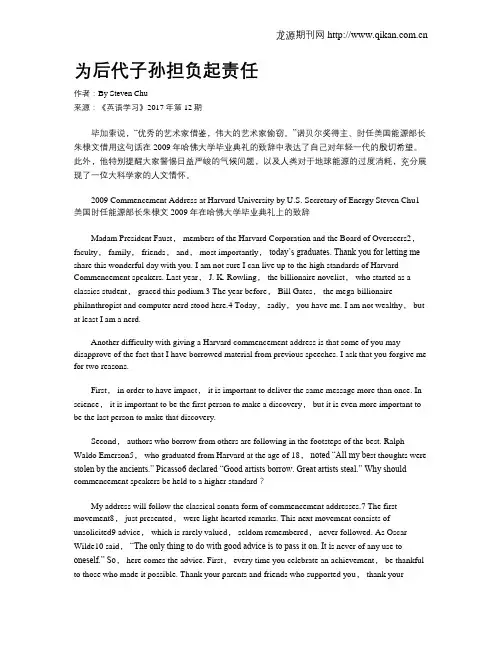
为后代子孙担负起责任作者:By Steven Chu来源:《英语学习》2017年第12期毕加索说,“优秀的艺术家借鉴,伟大的艺术家偷窃。
”诺贝尔奖得主、时任美国能源部长朱棣文借用这句话在2009年哈佛大学毕业典礼的致辞中表达了自己对年轻一代的殷切希望。
此外,他特别提醒大家警惕日益严峻的气候问题,以及人类对于地球能源的过度消耗,充分展现了一位大科学家的人文情怀。
2009 Commencement Address at Harvard University by U.S. Secretary of Energy Steven Chu1美国时任能源部长朱棣文2009年在哈佛大学毕业典礼上的致辞Madam President Faust, members of the Harvard Corporation and the Board of Overseers2,faculty, family, friends, and, most importantly,today’s graduates. Thank you for letting me share this wonderful day with you. I am not sure I can live up to the high standards of Harvard Commencement speakers. Last year, J. K. Rowling, the billionaire novelist, who started as a classics student, graced this podium.3 The year before, Bill Gates, the mega-billionaire philanthropist and computer nerd stood here.4 Today, sadly, you have me. I am not wealthy, but at least I am a nerd.Another difficulty with giving a Harvard commencement address is that some of you may disapprove of the fact that I have borrowed material from previous speeches. I ask that you forgive me for two reasons.First, in order to have impact, it is important to deliver the same message more than once. In science, it is important to be the first person to make a discovery, but it is even more important to be the last person to make that discovery.Second, authors who borrow from others are following in the footsteps of the best. Ralph Waldo Emerson5, who graduated from Harvard at the age of 18,noted “All my be st thoughts were stolen by the ancients.” Picasso6 declared “Good artists borrow. Great artists steal.” Why should commencement speakers be held to a higher standard?My address will follow the classical sonata form of commencement addresses.7 The first movement8, just presented, were light-hearted remarks. This next movement consists of unsolicited9 advice, which is rarely valued, seldom remembered, never followed. As Oscar Wilde10 said,“The only thing to do with good advice is to pass it on. It i s never of any use to oneself.” So, here comes the advice. First, every time you celebrate an achievement, be thankful to those who made it possible. Thank your parents and friends who supported you, thank your professors who were inspirational, and especially thank the other professors whose less-than-brilliant lectures forced you to teach yourself.11 Going forward, the ability to teach yourself is the hallmark of a great liberal arts education and will be the key to your success.12 To your fellow students who have added immeasurably to your education during those late night discussions, hug them. Also, of course, thank Harvard. Should you forget,there’s an alumni association13 to remind you. Second, in your future life, cultivate14 a generous spirit. In all negotiations,don’t bargain for the last, little advantage. Leave the change on the table. In your collaborations, always remember that “credit” is not a conserved quantity15. In a successful collaboration, everybody gets 90 percent of the credit.Jimmy Stewart, as Elwood P. Dowd in the movie Harvey got it exactly right.16 He said:“Years ago my mother used to say to me,‘In this world, Elwood, you must be... she always used to call me Elwood... in this world, Elwood, you must be oh so smart or o h so pleasant.’” Well,for years I was smart... I recommend pleasant. You may quote me on that.My third piece of advice is as follows: As you begin this new stage of your lives, follow your passion. If you don’t have a passion,don’t be satisfied until you find one. Life is too short to go through it without caring deeply about something. When I was your age, I was incredibly single-minded in my goal to be a physicist. After college, I spent eight years as a graduate student and postdoc at Berkeley, and then nine years at Bell Labs.17 During that time, my central focus and professional joy was physics.Here is my final piece of advice. Pursuing a personal passion is important, but it should not be your only goal. When you are old and gray, and look back on your life, you will want to be proud of what you have done. The source of that pride won’t be the things you have acquired or the recognition you have received. It will be the lives you have touched and the difference you have made.In the last several decades, our climate has been changing. If the world continues on a business-asusual path, the Intergovernmental Panel on Climate Change predicts that there is a fifty-fifty chance the temperature will exceed five degrees by the end of this century.18 This increase may not sound like much, but let me remind you that during the last ice age, the world was only six degrees colder. A world five degrees warmer will be very different. The change will be so rapid that many species, including Humans, will have a hard time adapting.The climate problem is the unintended consequence of our success. We depend on fossil energy19 to keep our homes warm in the winter, cool in the summer, and lit at night; we use it to travel across town and across continents. Energy is a fundamental reason for the prosperity we enjoy, and we will not surrender this prosperity.20 The United States has three percent of the world population, and yet, we consume 25 percent of the energy. By contrast, there are 1.6 billion people who don’t have access to electricity. Hundreds of millions of people still cook with twigs or dung.21 The life we enjoy may not be within the reach of the developing world, but it is within sight, and they want what we have.Here is the dilemma22. How much are we willing to invest, as a world society, to mitigate23 the consequences of climate change? Deeply rooted in all cultures, is the notion of generational responsibility. Parents work hard so that their children will have a better life. Climate change will affect the entire world, but our natural focus is on the welfare24 of our immediate families. Can we, as a world society, meet our responsibility to future generations?While I am worried, I am hopeful we will solve this problem. I became the director of the Lawrence Berkeley National Laboratory, in part because I wanted to enlist some of the best scientific minds to help battle against climate change.25 That’s where you come in. In this address, I am asking you, the Harvard graduates, to join us. As our future intellectual leaders, take the time to learn more about what’s at stake26, and then act on that knowledge.Finally, as humanists, I ask that you speak to our common humanity. One of the cruelest ironies about climate change is that the ones who will be hurt the most are the most innocent: the world’s poorest and those yet to be born.27Graduates, you have an extraordinary role to play in our future. As you pursue your private passions, I hope you will also develop a passion and a voice to help the world in ways both large and small. Nothing will give you greater satisfaction.Please accept my warmest congratulations. May you prosper28, may you help preserve and save our planet for your children, and all future children of the world.1. commencement:毕业典礼;Steven Chu:朱棣文(1948—),美籍华裔科学家,1997年诺贝尔物理奖获得者,曾任奥巴马政府能源部长(2009—2013)。
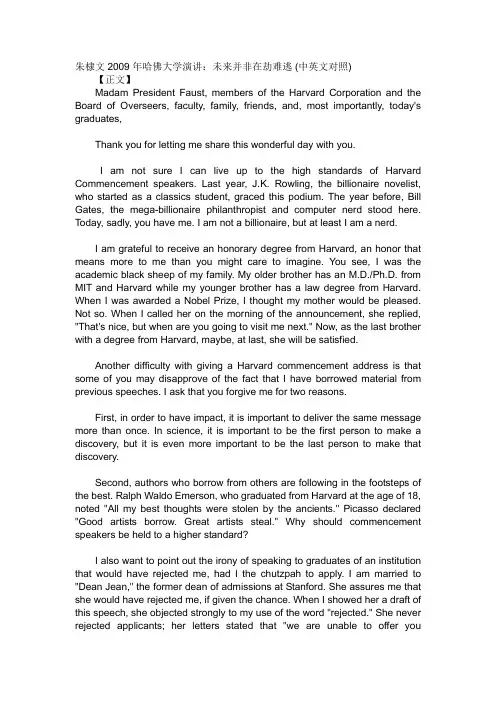
朱棣文2009年哈佛大学演讲:未来并非在劫难逃 (中英文对照)【正文】Madam President Faust, members of the Harvard Corporation and the Board of Overseers, faculty, family, friends, and, most importantly, today's graduates,Thank you for letting me share this wonderful day with you.I am not sure I can live up to the high standards of Harvard Commencement speakers. Last year, J.K. Rowling, the billionaire novelist, who started as a classics student, graced this podium. The year before, Bill Gates, the mega-billionaire philanthropist and computer nerd stood here. Today, sadly, you have me. I am not a billionaire, but at least I am a nerd.I am grateful to receive an honorary degree from Harvard, an honor that means more to me than you might care to imagine. You see, I was the academic black sheep of my family. My older brother has an M.D./Ph.D. from MIT and Harvard while my younger brother has a law degree from Harvard. When I was awarded a Nobel Prize, I thought my mother would be pleased. Not so. When I called her on the morning of the announcement, she replied, "That's nice, but when are you going to visit me next." Now, as the last brother with a degree from Harvard, maybe, at last, she will be satisfied.Another difficulty with giving a Harvard commencement address is that some of you may disapprove of the fact that I have borrowed material from previous speeches. I ask that you forgive me for two reasons.First, in order to have impact, it is important to deliver the same message more than once. In science, it is important to be the first person to make a discovery, but it is even more important to be the last person to make that discovery.Second, authors who borrow from others are following in the footsteps of the best. Ralph Waldo Emerson, who graduated from Harvard at the age of 18, noted "All my best thoughts were stolen by the ancients." Picasso declared "Good artists borrow. Great artists steal." Why should commencement speakers be held to a higher standard?I also want to point out the irony of speaking to graduates of an institution that would have rejected me, had I the chutzpah to apply. I am married to "Dean Jean," the former dean of admissions at Stanford. She assures me that she would have rejected me, if given the chance. When I showed her a draft of this speech, she objected strongly to my use of the word "rejected." She never rejected applicants; her letters stated that "we are unable to offer youadmission." I have difficulty understanding the difference. After all, deans of admissions of highly selective schools are in reality, "deans of rejection." Clearly, I have a lot to learn about marketing.My address will follow the classical sonata form of commencement addresses. The first movement, just presented, were light-hearted remarks. This next movement consists of unsolicited advice, which is rarely valued, seldom remembered, never followed. As Oscar Wilde said, "The only thing to do with good advice is to pass it on. It is never of any use to oneself." So, here comes the advice. First, every time you celebrate an achievement, be thankful to those who made it possible. Thank your parents and friends who supported you, thank your professors who were inspirational, and especially thank the other professors whose less-than-brilliant lectures forced you to teach yourself. Going forward, the ability to teach yourself is the hallmark of a great liberal arts education and will be the key to your success. To your fellow students who have added immeasurably to your education during those late night discussions, hug them. Also, of course, thank Harvard. Should you forget, there's an alumni association to remind you. Second, in your future life, cultivate a generous spirit. In all negotiations, don't bargain for the last, little advantage. Leave the change on the table. In your collaborations, always remember that "credit" is not a conserved quantity. In a successful collaboration, everybody gets 90 percent of the credit.Jimmy Stewart, as Elwood P. Dowd in the movie "Harvey" got it exactly right. He said: "Years ago my mother used to say to me, 'In this world, Elwood, you must be ... she always used to call me Elwood ... in this world, Elwood, you must be oh so smart or oh so pleasant.'" Well, for years I was smart. (I)recommend pleasant. You may quote me on that.My third piece of advice is as follows: As you begin this new stage of your lives, follow your passion. If you don't have a passion, don't be satisfied until you find one. Life is too short to go through it without caring deeply about something. When I was your age, I was incredibly single-minded in my goal to be a physicist. After college, I spent eight years as a graduate student and postdoc at Berkeley, and then nine years at Bell Labs. During that my time, my central focus and professional joy was physics.Here is my final piece of advice. Pursuing a personal passion is important, but it should not be your only goal. When you are old and gray, and look back on your life, you will want to be proud of what you have done. The source of that pride won't be the things you have acquired or the recognition you have received. It will be the lives you have touched and the difference you have made.After nine years at Bell labs, I decided to leave that warm, cozy ivory tower for what I considered to be the "real world," a university. Bell Labs, to quote what was said about Mary Poppins, was "practically perfect in every way," but I wanted to leave behind something more than scientific articles. I wanted to teach and give birth to my own set of scientific children.Ted Geballe, a friend and distinguished colleague of mine at Stanford, who also went from Berkeley to Bell Labs to Stanford years earlier, described our motives best:"The best part of working at a university is the students. They come in fresh, enthusiastic, open to ideas, unscarred by the battles of life. They don't realize it, but they're the recipients of the best our society can offer. If a mind is ever free to be creative, that's the time. They come in believing textbooks are authoritative, but eventually they figure out that textbooks and professors don't know everything, and then they start to think on their own. Then, I begin learning from them."My students, post doctoral fellows, and the young researchers who worked with me at Bell Labs, Stanford, and Berkeley have been extraordinary. Over 30 former group members are now professors, many at the best research institutions in the world, including Harvard. I have learned much from them. Even now, in rare moments on weekends, the remaining members of my biophysics group meet with me in the ether world of cyberspace.I began teaching with the idea of giving back; I received more than I gave. This brings me to the final movement of this speech. It begins with a story about an extraordinary scientific discovery and a new dilemma that it poses. It's a call to arms and about making a difference.In the last several decades, our climate has been changing. Climate change is not new: the Earth went through six ice ages in the past 600,000 years. However, recent measurements show that the climate has begun to change rapidly. The size of the North Polar Ice Cap in the month of September is only half the size it was a mere 50 years ago. The sea level which been rising since direct measurements began in 1870 at a rate that is now five times faster than it was at the beginning of recorded measurements. Here's the remarkable scientific discovery. For the first time in human history, science is now making predictions of how our actions will affect the world 50 and 100 years from now. These changes are due to an increase in carbon dioxide put into the atmosphere since the beginning of the Industrial Revolution. The Earth has warmed up by roughly 0.8 degrees Celsius since the beginning of the Revolution. There is already approximately a 1 degree rise built into the system, even if we stop all greenhouse gas emissions today. Why? It will takedecades to warm up the deep oceans before the temperature reaches a new equilibrium.If the world continues on a business-as-usual path, the Intergovernmental Panel on Climate Change predicts that there is a fifty-fifty chance the temperature will exceed 5 degrees by the end of this century. This increase may not sound like much, but let me remind you that during the last ice age, the world was only 6 degrees colder. During this time, most of Canada and the United States down to Ohio and Pennsylvania were covered year round by a glacier. A world 5 degrees warmer will be very different. The change will be so rapid that many species, including Humans, will have a hard time adapting. I've been told for example, that, in a much warmer world, insects were bigger. I wonder if this thing buzzing around is a precursor.We also face the specter of nonlinear "tipping points" that may cause much more severe changes. An example of a tipping point is the thawing of the permafrost. The permafrost contains immense amounts of frozen organic matter that have been accumulating for millennia. If the soil melts, microbes will spring to life and cause this debris to rot. The difference in biological activity below freezing and above freezing is something we are all familiar with. Frozen food remains edible for a very long time in the freezer, but once thawed, it spoils quickly. How much methane and carbon dioxide might be released from the rotting permafrost? If even a fraction of the carbon is released, it could be greater than all the greenhouse gases we have released to since the beginning of the industrial revolution. Once started, a runaway effect could occur.The climate problem is the unintended consequence of our success. We depend on fossil energy to keep our homes warm in the winter, cool in the summer, and lit at night; we use it to travel across town and across continents. Energy is a fundamental reason for the prosperity we enjoy, and we will not surrender this prosperity. The United States has 3 percent of the world population, and yet, we consume 25 percent of the energy. By contrast, there are 1.6 billion people who don't have access to electricity. Hundreds of millions of people still cook with twigs or dung. The life we enjoy may not be within the reach of the developing world, but it is within sight, and they want what we have.Here is the dilemma. How much are we willing to invest, as a world society, to mitigate the consequences of climate change that will not be realized for at least 100 years? Deeply rooted in all cultures, is the notion of generational responsibility. Parents work hard so that their children will have a better life. Climate change will affect the entire world, but our natural focus is on the welfare of our immediate families. Can we, as a world society, meet ourresponsibility to future generations?While I am worried, I am hopeful we will solve this problem. I became the director of the Lawrence Berkeley National Laboratory, in part because I wanted to enlist some of the best scientific minds to help battle against climate change. I was there only four and a half years, the shortest serving director in the 78-year history of the Lab, but when I left, a number of very exciting energy institutes at the Berkeley Lab and UC Berkeley had been established.I am extremely privileged to be part of the Obama administration. If there ever was a time to help steer America and the world towards a path of sustainable energy, now is the time. The message the President is delivering is not one of doom and gloom, but of optimism and opportunity. I share this optimism. The task ahead is daunting, but we can and will succeed.We know some of the answers already. There are immediate and significant savings in energy efficiency and conservation. Energy efficiency is not just low-hanging fruit; it is fruit lying on the ground. For example, we have the potential to make buildings 80 percent more efficient with investments that will pay for themselves in less than 15 years. Buildings consume 40 percent of the energy we use, and a transition to energy efficient buildings will cut our carbon emissions by one-third.We are revving up the remarkable American innovation machine that will be the basis of a new American prosperity. We will invent much improved methods to harness the sun, the wind, nuclear power, and capture and sequester the carbon dioxide emitted from our power plants. Advanced bio-fuels and the electrification of personal vehicles make us less dependent on foreign oil.In the coming decades, we will almost certainly face higher oil prices and be in a carbon-constrained economy. We have the opportunity to lead in development of a new, industrial revolution. The great hockey player, Wayne Gretzky, when asked, how he positions himself on the ice, he replied," I skate to where the puck is going to be, not where it's been." America should do the same.The Obama administration is laying a new foundation for a prosperous and sustainable energy future, but we don't have all of the answers. That's where you come in. In this address, I am asking you, the Harvard graduates, to join us. As our future intellectual leaders, take the time to learn more about what's at stake, and then act on that knowledge. As future scientists and engineers, I ask you to give us better technology solutions. As future economists and political scientists, I ask you to create better policy options. Asfuture business leaders, I ask that you make sustainability an integral part of your business.Finally, as humanists, I ask that you speak to our common humanity. One of the cruelest ironies about climate change is that the ones who will be hurt the most are the most innocent: the worlds poorest and those yet to be born.The coda to this last movement is borrowed from two humanists.The first quote is from Martin Luther King. He spoke on ending the war in Vietnam in 1967, but his message seems so fitting for today's climate crisis:"This call for a worldwide fellowship that lifts neighborly concern beyond one's tribe, race, class, and nation is in reality a call for an all-embracing and unconditional love for all mankind. This oft misunderstood, this oft misinterpreted concept, so readily dismissed by the Nietzsches of the world as a weak and cowardly force, has now become an absolute necessity for the survival of man ... We are now faced with the fact, my friends, that tomorrow is today. We are confronted with the fierce urgency of now. In this unfolding conundrum of life and history, there is such a thing as being too late."The final message is from William Faulkner. On December 10th, 1950, his Nobel Prize banquet speech was about the role of humanists in a world facing potential nuclear holocaust."I believe that man will not merely endure: he will prevail. He is immortal, not because he alone among creatures has an inexhaustible voice, but because he has a soul, a spirit capable of compassion and sacrifice and endurance. The poet's, the writer's, duty is to write about these things. It is his privilege to help man endure by lifting his heart, by reminding him of the courage and honor and hope and pride and compassion and pity and sacrifice which have been the glory of his past."Graduates, you have an extraordinary role to play in our future. As you pursue your private passions, I hope you will also develop a passion and a voice to help the world in ways both large and small. Nothing will give you greater satisfaction.Please accept my warmest congratulations. May you prosper, may you help preserve and save our planet for your children, and all future children of the world.尊敬的Faust校长,哈佛集团的各位成员,监管理事会的各位理事,各位老师,各位家长,各位朋友,以及最重要的各位毕业生同学,感谢你们,让我有机会同你们一起分享这个美妙的日子。
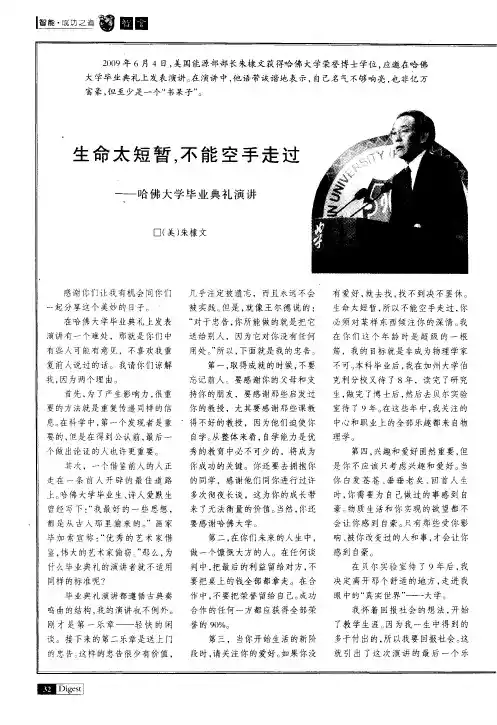

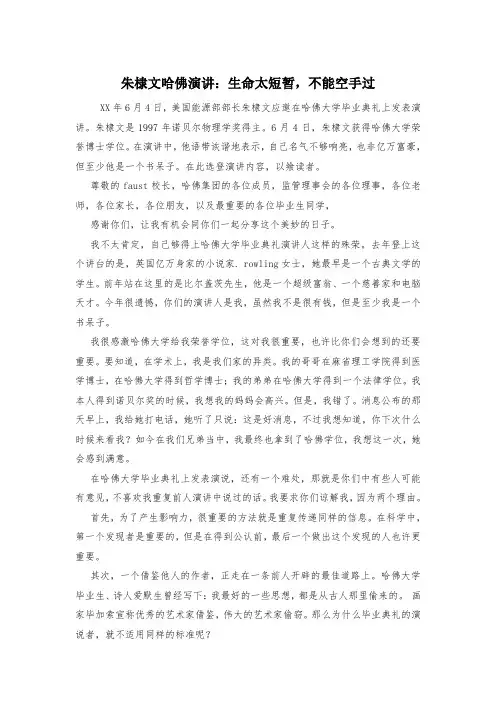
朱棣文哈佛演讲:生命太短暂,不能空手过XX年6月4日,美国能源部部长朱棣文应邀在哈佛大学毕业典礼上发表演讲。
朱棣文是1997年诺贝尔物理学奖得主。
6月4日,朱棣文获得哈佛大学荣誉博士学位。
在演讲中,他语带诙谐地表示,自己名气不够响亮,也非亿万富豪,但至少他是一个书呆子。
在此选登演讲内容,以飨读者。
尊敬的faust校长,哈佛集团的各位成员,监管理事会的各位理事,各位老师,各位家长,各位朋友,以及最重要的各位毕业生同学,感谢你们,让我有机会同你们一起分享这个美妙的日子。
我不太肯定,自己够得上哈佛大学毕业典礼演讲人这样的殊荣。
去年登上这个讲台的是,英国亿万身家的小说家. rowling女士,她最早是一个古典文学的学生。
前年站在这里的是比尔盖茨先生,他是一个超级富翁、一个慈善家和电脑天才。
今年很遗憾,你们的演讲人是我,虽然我不是很有钱,但是至少我是一个书呆子。
我很感激哈佛大学给我荣誉学位,这对我很重要,也许比你们会想到的还要重要。
要知道,在学术上,我是我们家的异类。
我的哥哥在麻省理工学院得到医学博士,在哈佛大学得到哲学博士;我的弟弟在哈佛大学得到一个法律学位。
我本人得到诺贝尔奖的时候,我想我的妈妈会高兴。
但是,我错了。
消息公布的那天早上,我给她打电话,她听了只说:这是好消息,不过我想知道,你下次什么时候来看我?如今在我们兄弟当中,我最终也拿到了哈佛学位,我想这一次,她会感到满意。
在哈佛大学毕业典礼上发表演说,还有一个难处,那就是你们中有些人可能有意见,不喜欢我重复前人演讲中说过的话。
我要求你们谅解我,因为两个理由。
首先,为了产生影响力,很重要的方法就是重复传递同样的信息。
在科学中,第一个发现者是重要的,但是在得到公认前,最后一个做出这个发现的人也许更重要。
其次,一个借鉴他人的作者,正走在一条前人开辟的最佳道路上。
哈佛大学毕业生、诗人爱默生曾经写下:我最好的一些思想,都是从古人那里偷来的。
画家毕加索宣称优秀的艺术家借鉴,伟大的艺术家偷窃。
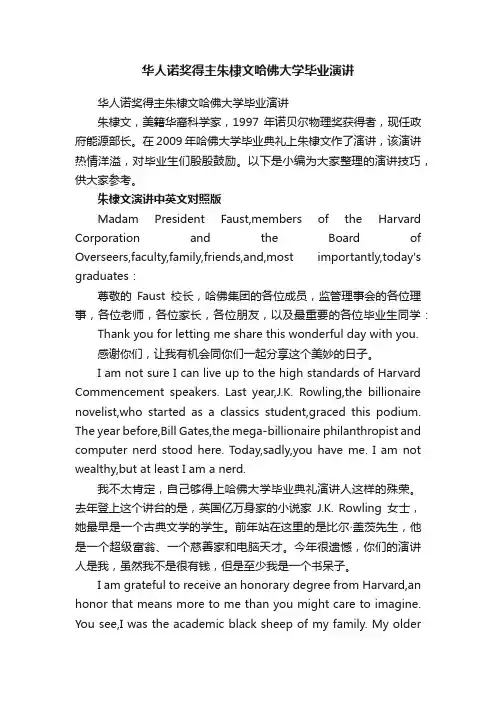
华人诺奖得主朱棣文哈佛大学毕业演讲华人诺奖得主朱棣文哈佛大学毕业演讲朱棣文,美籍华裔科学家,1997年诺贝尔物理奖获得者,现任政府能源部长。
在2009年哈佛大学毕业典礼上朱棣文作了演讲,该演讲热情洋溢,对毕业生们殷殷鼓励。
以下是小编为大家整理的演讲技巧,供大家参考。
朱棣文演讲中英文对照版Madam President Faust,members of the Harvard Corporation and the Board of Overseers,faculty,family,friends,and,most importantly,today's graduates:尊敬的Faust校长,哈佛集团的各位成员,监管理事会的各位理事,各位老师,各位家长,各位朋友,以及最重要的各位毕业生同学:Thank you for letting me share this wonderful day with you.感谢你们,让我有机会同你们一起分享这个美妙的日子。
I am not sure I can live up to the high standards of Harvard Commencement speakers. Last year,J.K. Rowling,the billionaire novelist,who started as a classics student,graced this podium. The year before,Bill Gates,the mega-billionaire philanthropist and computer nerd stood here. Today,sadly,you have me. I am not wealthy,but at least I am a nerd.我不太肯定,自己够得上哈佛大学毕业典礼演讲人这样的殊荣。
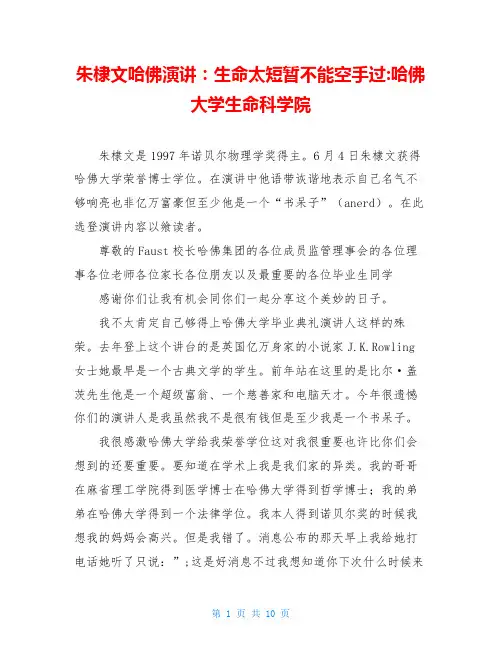
朱棣文哈佛演讲:生命太短暂不能空手过:哈佛大学生命科学院朱棣文是1997年诺贝尔物理学奖得主。
6月4日朱棣文获得哈佛大学荣誉博士学位。
在演讲中他语带诙谐地表示自己名气不够响亮也非亿万富豪但至少他是一个“书呆子”(anerd)。
在此选登演讲内容以飨读者。
尊敬的Faust校长哈佛集团的各位成员监管理事会的各位理事各位老师各位家长各位朋友以及最重要的各位毕业生同学感谢你们让我有机会同你们一起分享这个美妙的日子。
我不太肯定自己够得上哈佛大学毕业典礼演讲人这样的殊荣。
去年登上这个讲台的是英国亿万身家的小说家J.K.Rowling 女士她最早是一个古典文学的学生。
前年站在这里的是比尔·盖茨先生他是一个超级富翁、一个慈善家和电脑天才。
今年很遗憾你们的演讲人是我虽然我不是很有钱但是至少我是一个书呆子。
我很感激哈佛大学给我荣誉学位这对我很重要也许比你们会想到的还要重要。
要知道在学术上我是我们家的异类。
我的哥哥在麻省理工学院得到医学博士在哈佛大学得到哲学博士;我的弟弟在哈佛大学得到一个法律学位。
我本人得到诺贝尔奖的时候我想我的妈妈会高兴。
但是我错了。
消息公布的那天早上我给她打电话她听了只说:”;这是好消息不过我想知道你下次什么时候来看我?”如今在我们兄弟当中我最终也拿到了哈佛学位我想这一次她会感到满意。
在哈佛大学毕业典礼上发表演说还有一个难处那就是你们中有些人可能有意见不喜欢我重复前人演讲中说过的话。
我要求你们谅解我因为两个理由。
首先为了产生影响力很重要的方法就是重复传递同样的信息。
在科学中第一个发现者是重要的但是在得到公认前最后一个做出这个发现的人也许更重要。
其次一个借鉴他人的作者正走在一条前人开辟的最佳道路上。
哈佛大学毕业生、诗人爱默生曾经写下:“我最好的一些思想都是从古人那里偷来的。
”画家毕加索宣称”;优秀的艺术家借鉴伟大的艺术家偷窃。
”那么为什么毕业典礼的演说者就不适用同样的标准呢?我还要指出一点向哈佛毕业生发表演说对我来说是有讽刺意味的因为如果当年我斗胆向哈佛大学递交入学申请一定会被拒绝。
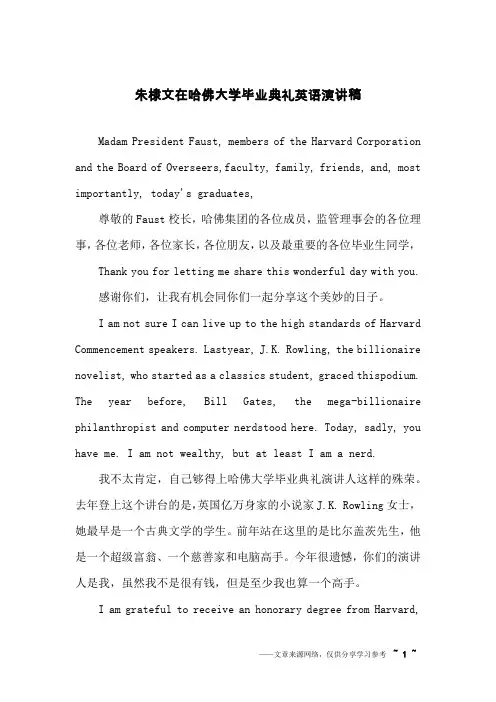
朱棣文在哈佛大学毕业典礼英语演讲稿Madam President Faust, members of the Harvard Corporation and the Board of Overseers,faculty, family, friends, and, most importantly, today's graduates,尊敬的Faust校长,哈佛集团的各位成员,监管理事会的各位理事,各位老师,各位家长,各位朋友,以及最重要的各位毕业生同学,Thank you for letting me share this wonderful day with you.感谢你们,让我有机会同你们一起分享这个美妙的日子。
I am not sure I can live up to the high standards of Harvard Commencement speakers. Lastyear, J.K. Rowling, the billionaire novelist, who started as a classics student, graced thispodium. The year before, Bill Gates, the mega-billionaire philanthropist and computer nerdstood here. Today, sadly, you have me. I am not wealthy, but at least I am a nerd.我不太肯定,自己够得上哈佛大学毕业典礼演讲人这样的殊荣。
去年登上这个讲台的是,英国亿万身家的小说家J.K. Rowling女士,她最早是一个古典文学的学生。
前年站在这里的是比尔盖茨先生,他是一个超级富翁、一个慈善家和电脑高手。
今年很遗憾,你们的演讲人是我,虽然我不是很有钱,但是至少我也算一个高手。
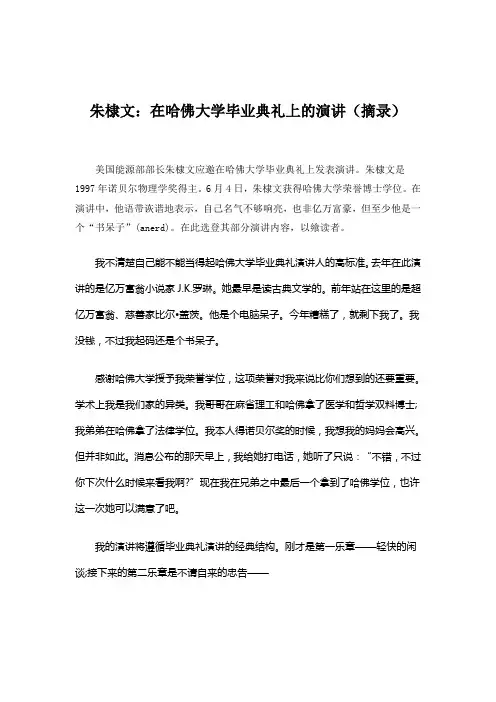
朱棣文:在哈佛大学毕业典礼上的演讲(摘录)美国能源部部长朱棣文应邀在哈佛大学毕业典礼上发表演讲。
朱棣文是1997年诺贝尔物理学奖得主。
6月4日,朱棣文获得哈佛大学荣誉博士学位。
在演讲中,他语带诙谐地表示,自己名气不够响亮,也非亿万富豪,但至少他是一个“书呆子”(anerd)。
在此选登其部分演讲内容,以飨读者。
我不清楚自己能不能当得起哈佛大学毕业典礼演讲人的高标准。
去年在此演讲的是亿万富翁小说家J.K.罗琳。
她最早是读古典文学的。
前年站在这里的是超亿万富翁、慈善家比尔•盖茨。
他是个电脑呆子。
今年糟糕了,就剩下我了。
我没钱,不过我起码还是个书呆子。
感谢哈佛大学授予我荣誉学位,这项荣誉对我来说比你们想到的还要重要。
学术上我是我们家的异类。
我哥哥在麻省理工和哈佛拿了医学和哲学双料博士;我弟弟在哈佛拿了法律学位。
我本人得诺贝尔奖的时候,我想我的妈妈会高兴。
但并非如此。
消息公布的那天早上,我给她打电话,她听了只说:“不错,不过你下次什么时候来看我啊?”现在我在兄弟之中最后一个拿到了哈佛学位,也许这一次她可以满意了吧。
我的演讲将遵循毕业典礼演讲的经典结构。
刚才是第一乐章——轻快的闲谈;接下来的第二乐章是不请自来的忠告——第一,每当你取得成就的时候,不要忘记帮助过你的人。
要感谢支持你的父母和朋友,要感谢那些启发过你的教授,而且尤其要感谢教得不怎么样的教授。
有了他们,你就不得不自学。
第二,在你们未来的人生中,培养一种慷慨大方的精神。
在任何谈判中,都不要为了最后微小的一丁点利益讨价还价。
不要把桌上的钱都拿走。
在合作中,永远记住荣誉不是一个守恒的量。
在一次成功合作中,任何一方都应获得全部荣誉的九成。
第三个忠告是,当你开始生活的新阶段时,请跟随你的爱好。
如果你没有爱好,就去找,找不到就不罢休。
生命太短暂,所以不能空手走过,你必须对某样东西倾注你的深情。
我在你们这个年龄,是超级的一根筋,我的目标就是非成为物理学家不可。
本科毕业后,我在加州大学伯克利分校又待了8年,读完了研究生,做完了博士后,然后去贝尔实验室待了9年。
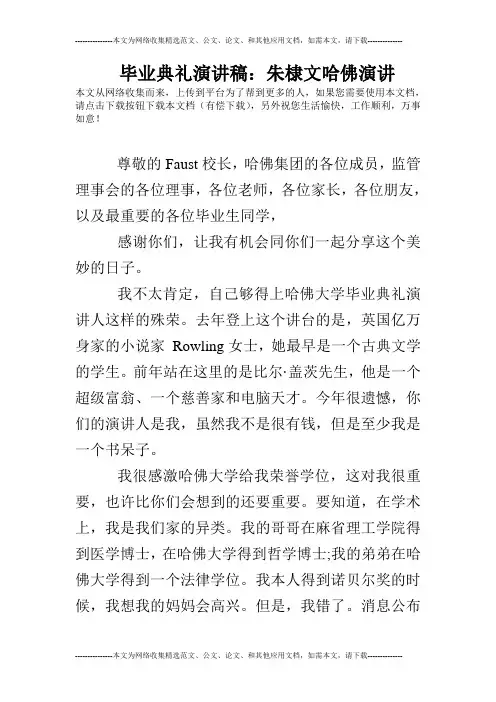
毕业典礼演讲稿:朱棣文哈佛演讲本文从网络收集而来,上传到平台为了帮到更多的人,如果您需要使用本文档,请点击下载按钮下载本文档(有偿下载),另外祝您生活愉快,工作顺利,万事如意!尊敬的Faust校长,哈佛集团的各位成员,监管理事会的各位理事,各位老师,各位家长,各位朋友,以及最重要的各位毕业生同学,感谢你们,让我有机会同你们一起分享这个美妙的日子。
我不太肯定,自己够得上哈佛大学毕业典礼演讲人这样的殊荣。
去年登上这个讲台的是,英国亿万身家的小说家Rowling女士,她最早是一个古典文学的学生。
前年站在这里的是比尔·盖茨先生,他是一个超级富翁、一个慈善家和电脑天才。
今年很遗憾,你们的演讲人是我,虽然我不是很有钱,但是至少我是一个书呆子。
我很感激哈佛大学给我荣誉学位,这对我很重要,也许比你们会想到的还要重要。
要知道,在学术上,我是我们家的异类。
我的哥哥在麻省理工学院得到医学博士,在哈佛大学得到哲学博士;我的弟弟在哈佛大学得到一个法律学位。
我本人得到诺贝尔奖的时候,我想我的妈妈会高兴。
但是,我错了。
消息公布的那天早上,我给她打电话,她听了只说:“这是好消息,不过我想知道,你下次什么时候来看我?”如今在我们兄弟当中,我最终也拿到了哈佛学位,我想这一次,她会感到满意。
在哈佛大学毕业典礼上发表演说,还有一个难处,那就是你们中有些人可能有意见,不喜欢我重复前人演讲中说过的话。
我要求你们谅解我,因为两个理由。
首先,为了产生影响力,很重要的方法就是重复传递同样的信息。
在科学中,第一个发现者是重要的,但是在得到公认前,最后一个做出这个发现的人也许更重要。
其次,一个借鉴他人的作者,正走在一条前人开辟的最佳道路上。
哈佛大学毕业生、诗人爱默生曾经写下:“我最好的一些思想,都是从古人那里偷来的。
” 画家毕加索宣称“优秀的艺术家借鉴,伟大的艺术家偷窃。
”那么为什么毕业典礼的演说者,就不适用同样的标准呢?我还要指出一点,向哈佛毕业生发表演说,对我来说是有讽刺意味的,因为如果当年我斗胆向哈佛大学递交入学申请,一定会被拒绝。
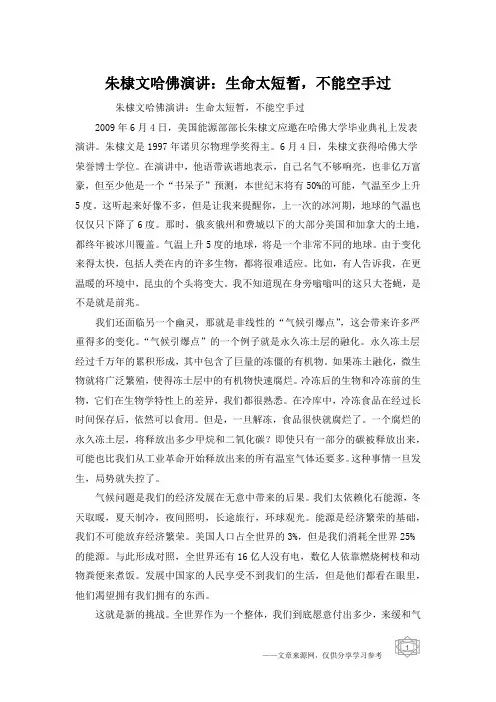
朱棣文哈佛演讲:生命太短暂,不能空手过朱棣文哈佛演讲:生命太短暂,不能空手过2009年6月4日,美国能源部部长朱棣文应邀在哈佛大学毕业典礼上发表演讲。
朱棣文是1997年诺贝尔物理学奖得主。
6月4日,朱棣文获得哈佛大学荣誉博士学位。
在演讲中,他语带诙谐地表示,自己名气不够响亮,也非亿万富豪,但至少他是一个“书呆子”预测,本世纪末将有50%的可能,气温至少上升5度。
这听起来好像不多,但是让我来提醒你,上一次的冰河期,地球的气温也仅仅只下降了6度。
那时,俄亥俄州和费城以下的大部分美国和加拿大的土地,都终年被冰川覆盖。
气温上升5度的地球,将是一个非常不同的地球。
由于变化来得太快,包括人类在内的许多生物,都将很难适应。
比如,有人告诉我,在更温暖的环境中,昆虫的个头将变大。
我不知道现在身旁嗡嗡叫的这只大苍蝇,是不是就是前兆。
我们还面临另一个幽灵,那就是非线性的“气候引爆点”,这会带来许多严重得多的变化。
“气候引爆点”的一个例子就是永久冻土层的融化。
永久冻土层经过千万年的累积形成,其中包含了巨量的冻僵的有机物。
如果冻土融化,微生物就将广泛繁殖,使得冻土层中的有机物快速腐烂。
冷冻后的生物和冷冻前的生物,它们在生物学特性上的差异,我们都很熟悉。
在冷库中,冷冻食品在经过长时间保存后,依然可以食用。
但是,一旦解冻,食品很快就腐烂了。
一个腐烂的永久冻土层,将释放出多少甲烷和二氧化碳?即使只有一部分的碳被释放出来,可能也比我们从工业革命开始释放出来的所有温室气体还要多。
这种事情一旦发生,局势就失控了。
气候问题是我们的经济发展在无意中带来的后果。
我们太依赖化石能源,冬天取暖,夏天制冷,夜间照明,长途旅行,环球观光。
能源是经济繁荣的基础,我们不可能放弃经济繁荣。
美国人口占全世界的3%,但是我们消耗全世界25%的能源。
与此形成对照,全世界还有16亿人没有电,数亿人依靠燃烧树枝和动物粪便来煮饭。
发展中国家的人民享受不到我们的生活,但是他们都看在眼里,他们渴望拥有我们拥有的东西。
朱棣文哈佛演讲稿中英文为大家整理朱棣文在20XX年哈佛大学毕业典礼上的演讲稿,在演讲中他当下的科学环境,以及对哈佛毕业生的寄语,朱棣文文因“发展了用激光冷却和捕获原子的方法”而获得1997年诺贝尔物理学奖。
朱棣文哈佛演讲稿中英文Madam President Faust, members of the Harvard Corporation and the Board of Overseers, faculty, family, friends, and, most importantly, today's graduates,尊敬的Faust校长,哈佛集团的各位成员,监治理事会的各位理事,各位老师,各位家长,各位朋友,以及最重要的各位毕业生同学,Thank you for letting me share this wonderful day with you.感谢你们,让我有机会同你们一起分享这个美妙的日子。
I am not sure I can live up to the high standards of Harvard Commencement speakers. Last year, J.K. Rowling, the billionaire novelist, who started as a classics student, graced this podium. The year before, Bill Gates, the mega-billionaire philanthropist and computer nerd stood here. Today, sadly, you have me. I am not a billionaire, but at least I am a nerd.我不太必然,本身够得上哈佛大学毕业典礼演讲人这样的殊荣。
去年登上这个讲台的是,英国亿万身家的小说家J.K. Rowling女士,她最早是一个古典文学的学生。
朱棣文演讲:生命太短暂,不能空手过!朱棣文是美国第12任能源部部长、xx年诺贝尔物理学奖获得者。
今天给大家分享一篇朱棣文在哈佛的毕业演讲,希望对大家有所帮助。
朱棣文演讲:生命太短暂,不能空手过!Madam President Faust, members of the Harvard Corporation and the Board of Overseers, faculty, family, friends, and, most importantly, todays graduates:尊敬的Faust校长,哈佛集团的各位成员,监管理事会的各位理事,各位老师,各位家长,各位朋友,以及最重要的各位毕业生同学:Thank you for letting me share this wonderful day with you.感谢你们,让我有机会同你们一起分享这个美妙的日子。
I am not sure I can live up to the high standards of Harvard Commencement speakers. Last year, J.K. Rowling, the billionaire novelist, who started as a classics student, graced this podium. The year before, Bill Gates, the mega-billionaire philanthropist and computer nerd stood here. Today, sadly, you have me. I am not wealthy, but at least I am a nerd.我不太肯定,自己够得上哈佛大学毕业典礼演讲人这样的殊荣。
去年登上这个讲台的是,英国亿万身家的小说家J.K. Rowling女士,她最早是一个古典文学的学生。
给大学毕业生的几个忠告—美国前能源部部长朱棣文Advice For Graduates给大学毕业生的几个忠告——美国能源部部长朱棣文As you begin this new stage of your lives, follow your passion. If you don’t have a passion, don’t be satis?ed until you?nd one. Life is too short to go through it without caring deeply about something. 当你开始生活的新阶段时,请追随你的爱好。
如果你没有爱好,就去找,找不到绝不罢休。
生命太短暂,所以不能空手走过,你必须对某样东西倾注你的深情。
2009 Commencement Address at Harvard University— U.S. Secretary of Energy Steven ChuMadam President Faust, members of the Harvard Corporation and the Board of Overseers, faculty, family, friends, and, most importantly, today’s graduates,Thank you for letting me share this wonderful day with you.I am not sure I can live up to the high standards of Harvard Commencement speakers. Last year, J.K. Rowling, the billionaire novelist, who started as a classics student, graced this podium. The year before, Bill Gates, the mega-billionaire philanthropist and computer nerd stood here. Today, sadly, you have me. I am not wealthy, but at least I am a nerd.My address will follow the classical sonata form of commencement addresses. The first movement, just presented, were light-hearted remarks. This next movement consists of unsolicited advice, which is rarely valued, seldom remembered, never followed. As Oscar Wilde said, “T he only thing to do with good advice is to pass it on. It is never of any use to oneself.”So, here comes the advice. First, every time you celebrate an achievement, be thankful to those who made it possible. Thank your parents and friends who supported you, thank your professors who were inspirational, and especially thank the other professors whose less-than-brilliant lectures forced you to teach yourself. Going forward, the ability to teach yourself is the hallmark of a great liberal arts education and will be the key to your success. To your fellow students who have added immeasurably to your education during those late night discussions, hug them. Also, of course, thank Harvard. Should you forget, there’s an alumni association to remind you.Second, i n your future life, cultivate a generous spirit. In all negotiations, don’tbargain for the last, little advantage. Leave the change on the table. In your collaborations, always remember that “credit” is not a conserved quantity. In a successful collaboration, everybody gets 90 percent of the credit.My third piece of advice is as follows: As you begin this new stage of your lives, follow your passion. If you don’t have a passion, don’t be satisfied until you find one. Life is too short to go through it without caring deeply about something.Here is my final piece of advice. Pursuing a personal passion is important, but it should not be your only goal. When you are old and gray, and look back on your life, you will want to be proud of what you have done. T he source of that pride won’t be the things you have acquired or the recognition you have received. It will be the lives you have touched and the difference you have made.Finally, as humanists, I ask that you speak to our common humanity. One of the cruelest ironies about climate change is that the ones who will be hurt the most are the most innocent: the worlds poorest and those yet to be born.The coda to this last movement is borrowed from two humanists.The first quote is from Martin Luther King. He spoke on ending the war in Vietnam in 1967, but his message seems so fitting for today’s climate crisis.“This call for a worldwide fellowship that lifts neighborly concern beyond one’s tribe, race, class, and nation is in reality a call for an all-embracing and unconditional love for all mankind. This oft misunderstood, this oft misinterpreted concept, so readily dismissed by the Nietzsches of the world as a weak and cowardly force, has now become an absolute necessity for the survival of man … We are no w faced with the fact, my friends, that tomorrow is today. We are confronted with the fierce urgency of now. In this unfolding conundrum of life and history, there is such a thing as being too late.”The final message is from William Faulkner. On December 10th, 1950, his Nobel Prize banquet speech was about the role of humanists in a world facing potential nuclear holocaust.“I believe that man will not merely endure: he will prevail. He is immortal, not because he alone among creatures has an inexhaustible voice, but because he has a soul, a spirit capable of compassion and sacrifice and endurance. The poet’s, the writer’s, duty is to write about these things. It is his privilege to help man endure by lifting his heart, by reminding him of the courage and honor and hope and pride and compassion and pity and sacrifice which have been the glory of his past.”Graduates, you have an extraordinary role to play in our future. As you pursue yourprivate passions, I hope you will also develop a passion and a voice to help the world in ways both large and small. Nothing will give you greater satisfaction.Please accept my warmest congratulations. May you prosper, may you help preserve and save our planet for your children, and all future children of the world.尊敬的Faust校长、哈佛集团的各位成员、监管理事会的各位理事长、各位老师、各位家长、各位朋友,以及最重要的各位毕业生同学,感谢你们,让我有机会同你们一起分享这个美妙的日子。
2009 Commencement Address at Harvard University- U.S. Secretary of Energy Steven ChuMadam President Faust, members of the Harvard Corporation and the Board of Overseers, faculty, family, friends, and, most importantly, today’s graduates,Thank you for letting me share this wonderful day with you.I am not sure I can live up to the high standards of Harvard Commencement speakers. Last year, J.K. Rowling, the billionaire novelist, who started as a classics student, graced this podium. The year before, Bill Gates, the mega-billionaire philanthropist and computer nerd stood here. Today, sadly, you have me. I am not wealthy, but at least I am a nerd.I am grateful to receive an honorary degree from Harvard, an honor that means more to me than you might care to imagine. You see, I was the academic black sheep of my family. My older brother has an M.D./Ph.D. from MIT and Harvard while my younger brother has a law degree from Harvard. When I was awarded a Nobel Prize, jwo the announcement, she replied, “That’s nice, but when are you going to visit me next.” Now, as the last brother with a degree from Harvard, maybe, at last, she will be satisfied.Another difficulty with giving a Harvard commencement address is that some of you may disapprove of the fact that I have borrowed material from previous speeches. I ask that you forgive me for two reasons.First, in order to have impact, it is important to deliver the same message more than once. In science, it is important to be the first person to make a discovery, but it is even more important to be the last person to make that discovery.Second, authors who borrow from others are following in the footsteps of the best. Ralph Waldo Emerson, who graduated from Harvard at the age of 18, noted “All my best thoughts were stole n by the ancients.” Picasso declared “Good artists borrow. Great artists steal.” Why should commencement speakers be held to a higher standard?I also want to point out the irony of speaking to graduates of an institution that would have rejected me, had I the chutzpah to apply. I am married to “Dean Jean,” the former dean of admissions at Stanford. She assures me that she would have rejected me, if given the chance. When I showed her a draft of this speech, she objected strongly to my use of the word “rejected.” She never rejected applicants; her letters stated that “we are unable to offer you admission.” I have difficulty understanding the difference. After all, deans of admissions of highly selective schools are in reality, “deans of rejection.” Clearly, I have a lot to learn about marketing.My address will follow the classical sonata form of commencement addresses. The first movement, just presented, were light-hearted remarks. This next movement consists of unsolicited advice, which is rarely valued, seldom remembered, never followed. As Oscar Wilde said, “The only thing to do with good advice is to pass it on. It is never of any use to oneself.” So, here comes the advice. First, every time you celebrate an achievement, be thankful to those who made it possible. Thank your parents and friends who supported you, thank your professors who were inspirational, and especially thank the other professors whose less-than-brilliant lectures forced you to teach yourself. Going forward, the ability to teach yourself is the hallmark of a great liberal arts education and will be the key to your success. To your fellow students who have added immeasurably to your education during those late night discussions, hug them. Also, of course, thank Harvard. Should you forget, there’s an alumni association to remind you. Second, in your future life, cultivate a generous spirit. In all negotiations, don’t bargain for the last, little advantage. Leave the change on the table. In your collaborations, always remember that “credit” i s not a conserved quantity. In a successful collaboration, everybody gets 90 percent of the credit.Another difficulty with giving a Harvard commencement address is that some of you may disapprove of the fact that I have borrowed material from previous speeches. I ask that you forgive me for two reasons.First, in order to have impact, it is important to deliver the same message more than once. In science, it is important to be the first person to make a discovery, but it is even more important to be the last person to make that discovery.Second, authors who borrow from others are following in the footsteps of the best. Ralph Waldo Emerson, who graduated from Harvard at the age of 18, noted “All my best thoughts were stolen by the ancients.” Picasso declared “Good artists borrow. Great artists steal.” Why should commencement speakers be held to a higher standard?I also want to point out the irony of speaking to graduates of an institution that would have rejected me, had I the chutzpah to apply. I am marrie d to “Dean Jean,” the former dean of admissions at Stanford. She assures me that she would have rejected me, if given the chance. When I showed her a draft of this speech, she objected strongly to my use of the word “rejected.” She never rejected applicant s; her letters stated that “we are unable to offer you admission.” I have difficulty understanding the difference. After all, deans of admissions of highly selective schools are in reality, “deans of rejection.” Clearly, I have a lot to learn about marketing.My address will follow the classical sonata form of commencement addresses. The first movement, just presented, were light-hearted remarks. This next movement consists of unsolicited advice, which is rarely valued, seldom remembered, never followed. As Oscar Wilde said, “The only thing to do with good advice is to pass it on. It is never of any use to oneself.” So, here comes the advice. First, every time youcelebrate an achievement, be thankful to those who made it possible. Thank your parents and friends who supported you, thank your professors who were inspirational, and especially thank the other professors whose less-than-brilliant lectures forced you to teach yourself. Going forward, the ability to teach yourself is the hallmark of a great liberal arts education and will be the key to your success. To your fellow students who have added immeasurably to your education during those late night discussions, hug them. Also, of course, thank Harvard. Should you forget, there’s an alumni association to remind you. Second, in your future life, cultivate a generous spirit. In all negotiations, don’t bargain for the last, little advantage. Leave the change on the table. In your collaborations, always remember that “credit” is not a conserved quantity. In a successful collaboration, everybody gets 90 percent of the credit.Here is my final piece of advice. Pursuing a personal passion is important, but it should not be your only goal. When you are old and gray, and look back on your life, you will want to be pro ud of what you have done. The source of that pride won’t be the things you have acquired or the recognition you have received. It will be the lives you have touched and the difference you have made.After nine years at Bell labs, I decided to leave that warm, cozy ivory tower for what I considered to be the “real world,” a university. Bell Labs, to quote what was said about Mary Poppins, was “practically perfect in every way,” but I wanted to leave behind something more than scientific articles. I wanted to teach and give birth to my own set of scientific children.Ted Geballe, a friend and distinguished colleague of mine at Stanford, who also went from Berkeley to Bell Labs to Stanford years earlier, described our motives best:“The best part of working at a university is the students. They come in fresh, enthusiastic, open to ideas, unscarred by the battles of life. They don’t realize it, but they’re the recipients of the best our society can offer. If a mind is ever free to be creative, that’s the time. Th ey come in believing textbooks are authoritative, but eventually they figure out that textbooks and professors don’t know everything, and then they start to think on their own. Then, I begin learning from them.”My students, post doctoral fellows, and the young researchers who worked with me at Bell Labs, Stanford, and Berkeley have been extraordinary. Over 30 former group members are now professors, many at the best research institutions in the world, including Harvard. I have learned much from them. Even now, in rare moments on weekends, the remaining members of my biophysics group meet with me in the ether world of cyberspace.I began teaching with the idea of giving back; I received more than I gave. This brings me to the final movement of this speech. It begins with a story about an extraordinary scientific discovery and a new dilemma that it poses. It’s a call to arms and about making a difference.In the last several decades, our climate has been changing. Climate change is not new: the Earth went through six ice ages in the past 600,000 years. However, recent measurements show that the climate has begun to change rapidly. The size of the North Polar Ice Cap in the month of September is only half the size it was a mere 50 years ago. The sea level which been rising since direct measurements began in 1870 at a rate that is now five times faster than it was at the beginning of recorded measurements. Here’s the remarkable scientific discovery. For the first time in human history, science is now making predictions of how our actions will affect the world 50 and 100 years from now. These changes are due to an increase in carbon dioxide put into the atmosphere since the beginning of the Industrial Revolution. The Earth has warmed up by roughly 0.8 degrees Celsius since the beginning of the Revolution. There is already approximately a 1 degree rise built into the system, even if we stop all greenhouse gas emissions today. Why? It will take decades to warm up the deep oceans before the temperature reaches a new equilibrium.If the world continues on a business-as-usual path, the Intergovernmental Panel on Climate Change predicts that there is a fifty-fifty chance the temperature will exceed 5 degrees by the end of this century. This increase may not sound like much, but let me remind you that during the last ice age, the world was only 6 degrees colder. During this time, most of Canada and the United States down to Ohio and Pennsylvania were covered year round by a glacier. A world 5 degrees warmer will be very different. The change will be so rapid that many species, including Humans, will have a hard time adapting. I’ve been told for example, that, in a much warmer world, insects were bigger. I wonder if this thing buzzing around is a precursor.We also face the spe cter of nonlinear “tipping points” that may cause much more severe changes. An example of a tipping point is the thawing of the permafrost. The permafrost contains immense amounts of frozen organic matter that have been accumulating for millennia. If the soil melts, microbes will spring to life and cause this debris to rot. The difference in biological activity below freezing and above freezing is something we are all familiar with. Frozen food remains edible for a very long time in the freezer, but once thawed, it spoils quickly. How much methane and carbon dioxide might be released from the rotting permafrost? If even a fraction of the carbon is released, it could be greater than all the greenhouse gases we have released to since the beginning of the industrial revolution. Once started, a runaway effect could occur.The climate problem is the unintended consequence of our success. We depend on fossil energy to keep our homes warm in the winter, cool in the summer, and lit at night; we use it to travel across town and across continents. Energy is a fundamental reason for the prosperity we enjoy, and we will not surrender this prosperity. The United States has 3 percent of the world population, and yet, we consume 25 percent of the energy. By contrast, there a re 1.6 billion people who don’t have access to electricity. Hundreds of millions of people still cook with twigs or dung. The life weenjoy may not be within the reach of the developing world, but it is within sight, and they want what we have.Here is the dilemma. How much are we willing to invest, as a world society, to mitigate the consequences of climate change that will not be realized for at least 100 years? Deeply rooted in all cultures, is the notion of generational responsibility. Parents work hard so that their children will have a better life. Climate change will affect the entire world, but our natural focus is on the welfare of our immediate families. Can we, as a world society, meet our responsibility to future generations?While I am worried, I am hopeful we will solve this problem. I became the director of the Lawrence Berkeley National Laboratory, in part because I wanted to enlist some of the best scientific minds to help battle against climate change. I was there only four and a half years, the shortest serving director in the 78-year history of the Lab, but when I left, a number of very exciting energy institutes at the Berkeley Lab and UC Berkeley had been established.I am extremely privileged to be part of the Obama administration. If there ever was a time to help steer America and the world towards a path of sustainable energy, now is the time. The message the President is delivering is not one of doom and gloom, but of optimism and opportunity. I share this optimism. The task ahead is daunting, but we can and will succeed.We know some of the answers already. There are immediate and significant savings in energy efficiency and conservation. Energy efficiency is not just low-hanging fruit; it is fruit lying on the ground. For example, we have the potential to make buildings 80 percent more efficient with investments that will pay for themselves in less than 15 years. Buildings consume 40 percent of the energy we use, and a transition to energy efficient buildings will cut our carbon emissions by one-third.We are revving up the remarkable American innovation machine that will be the basis of a new American prosperity. We will invent much improved methods to harness the sun, the wind, nuclear power, and capture and sequester the carbon dioxide emitted from our power plants. Advanced bio-fuels and the electrification of personal vehicles make us less dependent on foreign oil.In the coming decades, we will almost certainly face higher oil prices and be in a carbon-constrained economy. We have the opportunity to lead in development of a new, industrial revolution. The great hockey player, Wayne Gretzky, when asked, how he positions himself on the ice, he replied,“ I skate to where the puck is going to be, not where it’s been.” America should do the same.The Obama administration is laying a new foundation for a prosperous and sustainable energy future, but we don’t have all of the answers. That’s where you come in. In this address, I am asking you, the Harvard graduates, to join us. As our future intellectual leaders, take the time to learn more about what’s at stake, and thenact on that knowledge. As future scientists and engineers, I ask you to give us better technology solutions. As future economists and political scientists, I ask you to create better policy options. As future business leaders, I ask that you make sustainability an integral part of your business.Finally, as humanists, I ask that you speak to our common humanity. One of the cruelest ironies about climate change is that the ones who will be hurt the most are the most innocent: the worlds poorest and those yet to be born.The coda to this last movement is borrowed from two humanists.The first quote is from Martin Luther King. He spoke on ending the war in Vietnam in 1967, but hi s message seems so fitting for today’s climate crisis:“This call for a worldwide fellowship that lifts neighborly concern beyond one’s tribe, race, class, and nation is in reality a call for an all-embracing and unconditional love for all mankind. This oft misunderstood, this oft misinterpreted concept, so readily dismissed by the Nietzsches of the world as a weak and cowardly force, has now become an absolute necessity for the survival of man … We are now faced with the fact, my friends, that tomorrow is today. We are confronted with the fierce urgency of now. In this unfolding conundrum of life and history, there is such a thing as being too late.”The final message is from William Faulkner. On December 10th, 1950, his Nobel Prize banquet speech was about the role of humanists in a world facing potential nuclear holocaust.“I believe that man will not merely endure: he will prevail. He is immortal, not because he alone among creatures has an inexhaustible voice, but because he has a soul, a spirit capable of compassion and sacrifice and endurance. The poet’s, the writer’s, duty is to write about these things. It is his privilege to help man endure by lifting his heart, by reminding him of the courage and honor and hope and pride and compassion and pity and sacrifice which have been the glory of his past.”Graduates, you have an extraordinary role to play in our future. As you pursue your private passions, I hope you will also develop a passion and a voice to help the world in ways both large and small. Nothing will give you greater satisfaction.Please accept my warmest congratulations. May you prosper, may you help preserve and save our planet for your children, and all future children of the world.。
Madam President Faust, members of the Harvard Corporation and the Board of Ove rseers, faculty, family, friends, and, most importantly, today's graduates, 尊敬的Faust校长,哈佛集团的各位成员,监管理事会的各位理事,各位老师,各位家长,各位朋友,以及最重要的各位毕业生同学,Thank you for letting me share this wonderful day with you.感谢你们,让我有机会同你们一起分享这个美妙的日子。
I am not sure I can live up to the high standards of Harvard Commencement s peakers. Last year, J.K. Rowling, the billionaire novelist, who started as a classics st udent, graced this podium. The year before, Bill Gates, the mega-billionaire philanth ropist and computer nerd stood here. Today, sadly, you have me. I am not a billio naire, but at least I am a nerd.我不太肯定,自己够得上哈佛大学毕业典礼演讲人这样的殊荣。
去年登上这个讲台的是,英国亿万身家的小说家J.K. Rowling女士,她最早是一个古典文学的学生。
前年站在这里的是比尔•盖茨先生,他是一个超级富翁、一个慈善家和电脑高手。
今年很遗憾,你们的演讲人是我,虽然我不是很有钱,但是至少我也算一个高手。
朱棣文哈佛演讲稿(配翻译)(朱棣文演讲原音)朱棣文哈佛演讲My students, post doctoral fellows, and the young researchers who worked with me at Bell Labs, Stanford, and Berkeley have been extraordinary. Over 30 former group members are now professors, many at the best research institutions in the world, including Harvard. I have learned much from them. Even now, in rare moments on weekends, the remaining members of my biophysics group meet with me in the ether world of cyberspace.我教过的学生、带过的博士后、合作过的年轻同事,都非常优秀。
他们中有30多人,现在已经是教授了。
他们所在的研究机构有不少是全世界第一流的,其中就包括哈佛大学。
我从他们身上学到了很多东西。
即使现在,我偶尔还会周末上网,向现在还从事生物物理学研究的学生请教。
I began teaching with the idea of giving back; I received more than I gave. This brings me to the final movement of this speech. It begins with a story about an extraordinary scientific discovery and a new dilemma that it poses. It’s a call to arms and about making a difference.我怀着回报社会的想法,开始了教学生涯。
2009朱棣文:哈佛毕业典礼演讲(中英文)2009-08-06 19:06:45【演讲人介绍】朱棣文(Steven Chu,1948年2月28日-),美国物理学家,生于美国圣路易斯;华人血统,祖籍中国江苏太仓,曾获得诺贝尔物理学奖(1997年)。
现任美国能源部部长。
1970年,获罗彻斯特大学数学学士和物理学学士。
1976年,获加州大学伯克利分校物理学博士。
1987年,任斯坦福大学物理学教授,是该校第一位华裔教授。
1993年,当选美国国家科学院院士。
1997年,获诺贝尔物理学奖。
2004年,任劳伦斯?伯克利国家实验室主任,是首位掌管这个美国能源部下属国家实验室的亚裔人士。
2009年,出任奥巴马政府能源部长。
【正文】Madam President Faust, members of the Harvard Corporation and the Board of Overseers, faculty, family, friends, and, most importantly, today’s graduates,尊敬的Faust校长,哈佛集团的各位成员,监管理事会的各位理事,各位老师,各位家长,各位朋友,以及最重要的各位毕业生同学,Thank you for letting me share this wonderful day with you. 感谢你们,让我有机会同你们一起分享这个美妙的日子。
I am not sure I can live up to the high standards of Harvard Commencement speakers. Last year, J.K. Rowling, the billionaire novelist, who started as a classics student, graced th is podium. The year before, Bill Gates, the mega-billionaire philanthropist and computer nerd stood here. Today, sadly, you have me. I am not wealthy, but at least I am a nerd.我不太肯定,自己够得上哈佛大学毕业典礼演讲人这样的殊荣。
去年登上这个讲台的是,英国亿万身家的小说家J.K. Rowling女士,她最早是一个古典文学的学生。
前年站在这里的是比尔?盖茨先生,他是一个超级富翁、一个慈善家和电脑天才。
今年很遗憾,你们的演讲人是我,虽然我不是很有钱,但是至少我是一个书呆子。
I am grateful to receive an honorary degree from Harvard, a n honor that means more to me than you might care to ima gine. You see, I was the academic black sheep of my family. My older brother has an M.D./Ph.D. from MIT and Harvard while my younger brother has a law degree from Harvard. When I was awarded a Nobel Prize, I thought my mother wo uld be pleased. Not so. When I called her on the morning of the announcement, she replied, “That’s nice, but when a re you going to visit me next.”Now, as the last brother with a degree from Harvard, maybe, at last, she will be satisfi ed.我很感激哈佛大学给我荣誉学位,这对我很重要,也许比你们会想到的还要重要。
要知道,在学术上,我是我们家的异类。
我的哥哥在麻省理工学院得到医学博士,在哈佛大学得到哲学博士;我的弟弟在哈佛大学得到一个法律学位。
我本人得到诺贝尔奖的时候,我想我的妈妈会高兴。
但是,我错了。
消息公布的那天早上,我给她打电话,她听了只说:“这是好消息,不过我想知道,你下次什么时候来看我?”如今在我们兄弟当中,我最终也拿到了哈佛学位,我想这一次,她会感到满意。
Another difficulty with giving a Harvard commencement addr ess is that some of you may disapprove of the fact that I h ave borrowed material from previous speeches. I ask that yo u forgive me for two reasons.在哈佛大学毕业典礼上发表演说,还有一个难处,那就是你们中有些人可能有意见,不喜欢我重复前人演讲中说过的话。
我要求你们谅解我,因为两个理由。
First, in order to have impact, it is important to deliver the same message more than once. In science, it is important t o be the first person to make a discovery, but it is even m ore important to be the last person to make that discovery.首先,为了产生影响力,很重要的方法就是重复传递同样的信息。
在科学中,第一个发现者是重要的,但是在得到公认前,最后一个做出这个发现的人也许更重要。
Second, authors who borrow from others are following in th e footsteps of the best. Ralph Waldo Emerson, who graduated from Harvard at the age of 18, noted “All my best thou ghts were stolen by the ancients.”Picasso declared “Goo d artists borrow. Great artists steal.”Why should commenc ement speakers be held to a higher standard?其次,一个借鉴他人的作者,正走在一条前人开辟的最佳道路上。
哈佛大学毕业生、诗人爱默生曾经写下:“我最好的一些思想,都是从古人那里偷来的。
”画家毕加索宣称“优秀的艺术家借鉴,伟大的艺术家偷窃。
”那么为什么毕业典礼的演说者,就不适用同样的标准呢?I also want to point out the irony of speaking to graduates of an institution that would have rejected me, had I the chutzpah to apply. I am married to “Dean Jean,”the former dean of admissions at Stanford. She assures me that she wo uld have rejected me, if given the chance. When I showed h er a draft of this speech, she objected strongly to my use of the word “rejected.”She never rejected applicants; her l etters stated that “we are unable to offer you admission.”I have difficulty understanding the difference. After all, dean s of admissions of highly selective schools are in reality,“deans of rejection.”Clearly, I have a lot to learn about m arketing.我还要指出一点,向哈佛毕业生发表演说,对我来说是有讽刺意味的,因为如果当年我斗胆向哈佛大学递交入学申请,一定会被拒绝。
我的妻子Jean当过斯坦福大学的招生主任,她向我保证,如果当年我申请斯坦福大学,她会拒绝我。
我把这篇演讲的草稿给她过目,她强烈反对我使用“拒绝”这个词,她从来不拒绝任何申请者。
在拒绝信中,她总是写:“我们无法提供你入学机会。
”我分不清两者到底有何差别。
不过,那些大热门学校的招生主任总是很现实的,堪称“拒绝他人的主任”。
很显然,我需要好好学学怎么来推销自己。
My address will follow the classical sonata form of commen cement addresses. The first movement, just presented, were light-hearted remarks. This next movement consists of unso licited advice, which is rarely valued, seldom remembered, never followed. As Oscar Wilde said, “The only thing to do with good advice is to pass it on. It is never of any use to oneself.”So, here comes the advice. First, every time youcelebrate an achievement, be thankful to those who made it possible. Thank your parents and friends who supported yo u, thank your professors who were inspirational, and especi ally thank the other professors whose less-than-brilliant lectures forced you to teach yourself. Going forward, the ability to teach yourself is the hallmark of a great liberal arts edu cation and will be the key to your success. To your fellow students who have added immeasurably to your education d uring those late night discussions, hug them. Also, of course, thank Harvard. Should you forget, there’s an alumni ass ociation to remind you. Second, in your future life, cultivate a generous spirit. In all negotiations, don’t bargain for the last, little advantage. Leave the change on the table. In your collaborations, always remember that “credit”is not a conserved quantity. In a successful collaboration, everybody g ets 90 percent of the credit.毕业典礼演讲都遵循古典奏鸣曲的结构,我的演讲也不例外。